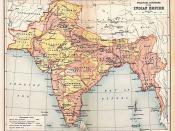.THE UPRISING OF 1857.
Investigate the causes of the uprising and consider the implications of the two terms "mutiny" and "war of independence". Why did the British prefer the term mutiny? Why did the certain Indians prefer to see the incident as a war of independence? What were the consequences of the upheavel?
As with any conflict or controversy there are always two sides to the debate, and the events in
India during 1857 are certainly no exception. Given the situation in India during the nineteenth
century it is hardly surprising that such a polarisation of opinion exists regarding the context of
the rebellious events during that year. The British being in control of the subcontinent and their
sense of superiority over their Indian subjects, would naturally seek to downplay any acts of
rebellion. While the Indian subjects on the other hand would arguably wish to exaggerate and over
emphasise the importance of these events, as a means of promoting the nationalist cause for self
determination. The truth of the events themselves, does it lie towards the British account or the
Indian pro nationalistic side, or could there be a certain amount of truth in both sides of the
debate.
Metcalf in his account cites three indisputable factors behind the outbreak of rebellion in 1857.
Primarily he sees `accumulating grievances of the Sepoy Army of Bengal' as the most important
factor. The reasons behind this `deterioration of morale' amongst the army lay with several
reasons. Much of the Sepoy army was comprised of `Brahmins and other high caste Hindus' who
assisted in promoting a `focus of sedition'. The `generally poor standard of British officers', plus
the lack of improvement to the overall position of those men serving in the army also increased
the level of tension. At this point...



Great
This was a really good essay. Detailed and insightful.
0 out of 0 people found this comment useful.